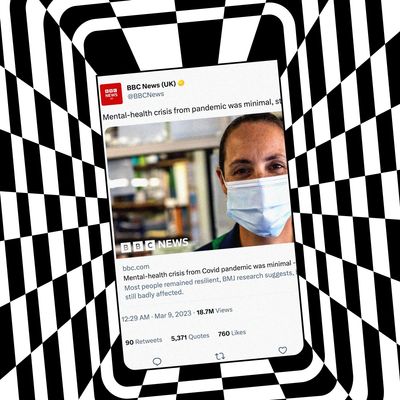
I Can’t Shut Up About: Deep dives into my online obsession of the week.
Great news! We’re actually all doing perfectly fine. According to a new study from the BMJ, the (technically still ongoing) pandemic didn’t have a significant impact on our mental health. Hooray! “Mental health and anxiety symptoms hardly deteriorated at all during the pandemic,” states BBC’s coverage of the study. On the contrary, as nearly every quote reply to BBC’s tweet sharing the study suggests, yes, it did.
How else do you explain Gal Gadot’s “Imagine” video, which she recorded a whopping six days into quarantine. Six! This was weeks, if not months, before we started banging pots and pans to say “thank you” and a song from Nickelodeon’s animated children’s show The Backyardigans debuted at No. 1 on Spotify’s Viral 50. (The latter should be indication enough of our deteriorating mental health.) Over the course of the past three years, we have watched people in hazmat suits hand out Emmys (or not hand out Emmys). We’ve stockpiled toilet paper and panic-bought bidets. The hottest trends of summer 2020 included making sourdough bread and doing jigsaw puzzles. And those are just the things we talked about publicly!
Privately, we passed our seemingly limitless amount of idle time self-soothing in any way possible. (Unless, of course, you were among the many parents stuck at home with toddlers forced to answer the question “How much Cocomelon is too much Cocomelon?”) Hyperfixations took on a new level of obsession. For example, I made a slideshow categorizing Love Island U.K. contestants as different types of pasta (Ched from season six is rigatoni, season five’s Molly-Mae is fettuccine alfredo). We plucked ideas from the furthest corner of our minds just to see what they’d do together (e.g., a garland made of plastic babies). We smoothed out our brains and acted on pure impulse (e.g., Chicken McNugget power hour). My sister and I rediscovered our love of a musical game we created in our youth: the dissonance game. This is when you and your sister each sing a random note, and the worse they sound together, the better. No one wins!
If the Twitter responses weren’t enough cause for skepticism, BBC’s initial tweet sharing the study now comes with an additional note of context: “The headline’s statement that impact was ‘minimal’ may be misleading, as the article states that the cited study does not focus on those most likely to be affected.” Although the BMJ study analyzed 137 different studies, subjects were primarily from “high-income European and Asian countries.” As BBC’s coverage points out, the study “risks hiding important effects among disadvantaged groups” as it did not include data from low-income countries or groups whose mental health was most likely to be impacted by the pandemic. In fact, the study found that depression symptoms did worsen among several demographics — including “women, older people, university students and those belonging to sexual or gender minorities.” Multiple other studies — which have found a worldwide increase in depression and anxiety, high levels of self-reported stress, and Olivia Rodrigo’s “driver’s license” to be among the most-streamed songs of 2021 — suggest that perhaps the pandemic had a measurable impact on our mental health after all.
Furby fan art and Animal Crossing graduation parties aside, it’s difficult to measure the lasting effects of the pandemic when we are arguably still experiencing its shock waves. P. E. Moskowitz spoke to this in the latest installment of their Mental Hellth newsletter, drawing inspiration from writer Ryan Broderick’s response to the BMJ study:
Whatever your views on government action (or inaction) during the pandemic, I think being locked in your house for weeks or months on end, or forced to work while knowing people were dying around you, or simply being asked to move on and kind of pretend the whole thing never happened, is enough to drive you insane! I’ve heard from lots of people about how road rage seems worse, about how people seem less friendly, about how everyone seems a bit … off. To which I say, duh! We’re all like, traumatized or whatever.
On top of the COVID-19 pandemic, 2020 began with Australia on fire, reignited a cultural reckoning with racist police brutality, and ended with Donald Trump claiming that the presidential election was stolen. Then January 6 happened. We’re watching the worsening consequences of global warming as natural disasters intensify. While many of us had to figure out how to stretch our measly stimulus checks, billionaires in the U.S. added more than $1 trillion to their combined net worth.
“Our collective inability to recognize trauma, to admit that we’re feeling a bit insane, to admit we are affected by the world, is something that extends far beyond the pandemic,” Moskowitz writes. “We’re encouraged to shut up about the world, to let it roll off our backs.”
The pandemic simply exacerbated the fact that we’ve been living, and continue to live, in a constant state of cognitive dissonance. I suppose, by comparison, banging pots and pans does seem perfectly fine.

